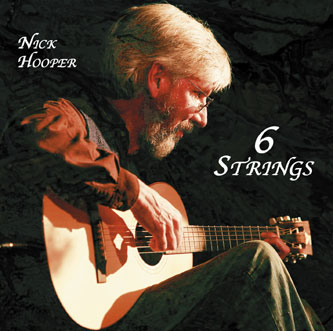 Best
known for their reissue CDs and new albums by rock legends, Angel
Air steps into the acoustic instrumental guitar arena with the 2018
CD release of 6 Strings by U.K. guitarist Nick Hooper.
Describing his album as being “Irish music and is affinity with
the guitar”, Hooper’s guitar prowess is very impressive
and as such fans of U.K. guitar icons like Gordon Giltrap and even
Steve Howe will be mighty impressed with 6 Strings. Speaking
about his 2018 Angel Air CD release, Nick tells mwe3.com, "I
decided to make an album of my favorite Irish tunes. After the massive
weight and complexity of the Potter films, and other films besides,
I wanted to do something really small scale, so I called the album
6 Strings because that is all it is: just the six strings of the solo
guitar." Some tracks evoke Tommy Emmanuel’s guitar style
but others are much more in line with classical guitarists like Julian
Bream and even John Williams. In recent years, Nick has done soundtrack
work for several Harry Potter films yet on 6 Strings, Nick
Hooper takes you back to the lute and classical guitar of the Elizabethan
era and the heyday of instrumental Irish and English folk music. www.wordandnote.com
/ www.angelair.co.uk
Best
known for their reissue CDs and new albums by rock legends, Angel
Air steps into the acoustic instrumental guitar arena with the 2018
CD release of 6 Strings by U.K. guitarist Nick Hooper.
Describing his album as being “Irish music and is affinity with
the guitar”, Hooper’s guitar prowess is very impressive
and as such fans of U.K. guitar icons like Gordon Giltrap and even
Steve Howe will be mighty impressed with 6 Strings. Speaking
about his 2018 Angel Air CD release, Nick tells mwe3.com, "I
decided to make an album of my favorite Irish tunes. After the massive
weight and complexity of the Potter films, and other films besides,
I wanted to do something really small scale, so I called the album
6 Strings because that is all it is: just the six strings of the solo
guitar." Some tracks evoke Tommy Emmanuel’s guitar style
but others are much more in line with classical guitarists like Julian
Bream and even John Williams. In recent years, Nick has done soundtrack
work for several Harry Potter films yet on 6 Strings, Nick
Hooper takes you back to the lute and classical guitar of the Elizabethan
era and the heyday of instrumental Irish and English folk music. www.wordandnote.com
/ www.angelair.co.uk
mwe3.com presents an interview with
Nick Hooper
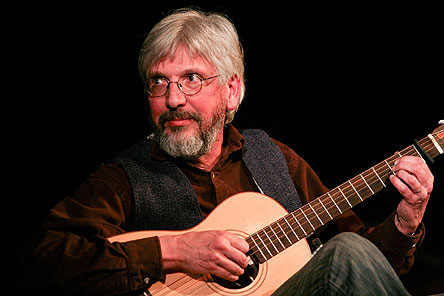 mwe3:
Can you tell the readers where you’re from originally and where
you live now and what you like best about it? What other cities and
countries do you like to visit and also perform your music in? Have
you been to the US yet?
mwe3:
Can you tell the readers where you’re from originally and where
you live now and what you like best about it? What other cities and
countries do you like to visit and also perform your music in? Have
you been to the US yet?
Nick Hooper: I was brought up in a large Victorian house in
a town called Harpenden. I will always remember that first house as
a place where my imagination and creativity had a chance to flourish,
and it comes into the novels that I write now.
After studying in London, and then moving to Oxford to live, I ended
up in a small village in the Oxfordshire countryside. We live in a
17th Century cottage that was once a pub, and in addition we are very
fortunate to have a bolt-hole in Wales – a converted Mill by
a river. I love sitting by the river, just looking and listening,
and I have a favorite oak tree that I like to stand by and look out
over the beautiful welsh countryside.
In the past my work as a musician, and especially as a film composer,
has taken me to France, Hungary, India, Brazil and Peru. I have been
to the US a couple of times: firstly to the Grand Canyon, which was
awesome. I was doing the score for a BBC film about it; and secondly
to L.A. which I really enjoyed, especially the breakfasts.
mwe3: What were some events that led to the release your 2018
CD, 6 Strings on the Angel Air label? Angel Air has really
been doing great works for not only classic U.K. rock but also for
guitar fans. I know they’ve also put out some releases for Gordon
Giltrap and now your album, so guitar fans are in fretboard heaven
thanks to Angel Air!
Nick Hooper: This is quite a story. I decided to make an album
of my favorite Irish tunes. After the massive weight and complexity
of the Potter films, and other films besides, I wanted to do something
really small scale, so I called the album 6 Strings because
that is all it is: just the six strings of the solo 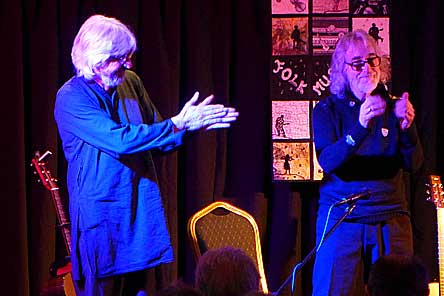 guitar.
The guitar I used was made for me by the well-known English maker
Rob Armstrong, and I wanted to send him some copies of the CD, but
couldn’t find his address. Going on the web, all I could find
was that Gordon Giltrap promoted Rob’s guitars, so I emailed
Gordon. He got straight back with the message that Rob’s address
was on the label. I felt a bit stupid… I’m terrible at reading
labels! To thank Gordon for putting this valuable piece of information
my way, I send him a copy of 6 Strings. He loved it, and we
arranged to meet with the result that we have become great friends
and now perform together. Gordon also helped me get my new guitar,
which is a Fylde, and he generously leant the maker, Roger Bucknall,
his own favorite Fylde so that it could be copied. Later on, Gordon
introduced me to Peter Purnell of Angel Air records, and Peter decided
to re-release 6 Strings on the Angel Air label.
guitar.
The guitar I used was made for me by the well-known English maker
Rob Armstrong, and I wanted to send him some copies of the CD, but
couldn’t find his address. Going on the web, all I could find
was that Gordon Giltrap promoted Rob’s guitars, so I emailed
Gordon. He got straight back with the message that Rob’s address
was on the label. I felt a bit stupid… I’m terrible at reading
labels! To thank Gordon for putting this valuable piece of information
my way, I send him a copy of 6 Strings. He loved it, and we
arranged to meet with the result that we have become great friends
and now perform together. Gordon also helped me get my new guitar,
which is a Fylde, and he generously leant the maker, Roger Bucknall,
his own favorite Fylde so that it could be copied. Later on, Gordon
introduced me to Peter Purnell of Angel Air records, and Peter decided
to re-release 6 Strings on the Angel Air label.
mwe3: How did you become interested in the classical guitar
and tell us about your early recordings of J.S. Bach. Is your Bach
album still in print? Do you differentiate between classical nylon
string and steel string or silk and steel string guitars? Also, were
rock guitarists or jazz guitarists an influence on you too?
Nick Hooper: When I was 9 years old, we went on holiday to
Spain, and I heard the most amazing young flamenco guitarist. I then
decided that I had to have a guitar, so on my 10th birthday my parents
gave me one. I couldn’t play it, it just seemed too difficult,
so I sold it to my sister. Then, 4 years later when I started to become
interested in girls, I realized that playing guitar might make them
notice me. So I bought the guitar back off my sister, and started
playing things like The House of the Rising Sun. My father,
who was a keen amateur cellist, encouraged me to take lessons with
the classical guitarist Charles Gregory. When he heard me play some
blues, he asked me why I wanted to do classical guitar when I had
talent as a blues player, but by then I was hooked on Segovia and
John Williams. I left school at 15 and practiced at least 4 hours
a day.
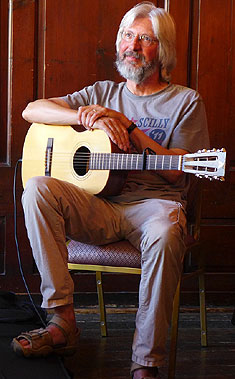 I went to
France to study with Alexandre Lagoya who was the duo partner of Ida
Presti. I adopted his French way of playing, and became a complete
fan of Ida Presti, who sadly had died some years earlier. When I made
my Bach album many years later, I was still using the French technique,
which made a very beautiful sound. At that time I was still very much
a classical guitarist, though I had played in various folk duos including
one with Chris Leslie of Fairport Convention. The Bach album, which
was recorded by Steve Smith of SCS Music, has sadly been out of print
for many years. Other guitarists that influenced me would have to
be John Renbourn, Bert Jansch, and Arty McGlynn.
I went to
France to study with Alexandre Lagoya who was the duo partner of Ida
Presti. I adopted his French way of playing, and became a complete
fan of Ida Presti, who sadly had died some years earlier. When I made
my Bach album many years later, I was still using the French technique,
which made a very beautiful sound. At that time I was still very much
a classical guitarist, though I had played in various folk duos including
one with Chris Leslie of Fairport Convention. The Bach album, which
was recorded by Steve Smith of SCS Music, has sadly been out of print
for many years. Other guitarists that influenced me would have to
be John Renbourn, Bert Jansch, and Arty McGlynn.
mwe3: Tell us about recording various film music you’ve
done and how it led to making the Harry Potter soundtracks? How many
films and TV shows have done music for and what about recording at
Abbey Road? What was that like? Must have been a thrill to return
there for the recording and then mastering of 6 Strings at
Abbey Road too.
Nick Hooper: Shortly after making the Bach CD, a couple of
friends introduced me to a film composer who told me how to get work
composing music for TV. I followed his advice and was soon doing nature
films, later on for the BBC. But I always wanted to do TV dramas,
so I looked for a way to find a young and promising director who needed
an experienced composer. By making inquiries, I discovered that David
Yates was living in the next village. David was at the National Film
School at that time and I scored his graduation film Good Looks.
We then worked together on nearly everything he did, landing big
series for the BBC, and in the course of that, gaining two BAFTAs
and an Ivor Novello for the music. When David was asked to direct
Harry Potter and The Order of the Phoenix, he got me on board,
and we went on to do the next film as well.
Working at Abbey Road was a great experience. It is a warm and friendly
place, and the people there have an enormous amount of expertise.
The studios are wonderful to record in, and once I had recorded with
orchestra there, I never wanted to work anywhere else. The team I
had for the Potter films was amazing: Peter Cobbin was the engineer,
and steered me through the most challenging time of my career; Cool
Music fixed me the most fabulous orchestra; Alastair King oversaw
the creating of parts for orchestra, and did most of the conducting;
and all this was organized by my agent Darrell Alexander. What a scary
and amazing time! By the time I stopped doing films and TV I must
have scored well over 300 films. Lost count.
mwe3: What is your connection with Irish music? Is Irish music
and English music similar in scope? Are all the tracks and songs on
6 Strings covers of traditional music? Most of the music on
6 Strings are either traditional or tunes written by O’
Carolan. Is that the same Irish musician that lived in the late 1600’
and early 1700’s? He must have been an amazing person! How many
of his songs do you play?
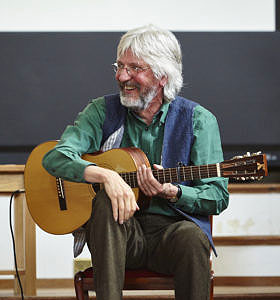 Nick Hooper:
When I was 16 I went to Ireland with my parents on a boat trip down
the Shannon. We went to a pub and there was a 12 string guitar hanging
above the door. I asked if I could play it and it seems it hadn’t
been played or tuned for years. I tuned it up, and the whisper went
around the pub “He’s tuned the 12 string, he’s tuned
the 12 string.” It was like I’d taken Excalibur out of the
stone. A great session followed, and years later back in Oxford I
played in an Irish band called the Highly Strung Band. I used to play
Irish tunes for free pints of Guinness. It’s wonderful music,
and greatly suited to the guitar. I was told about O’ Carolan
and transcribed a number of his tunes. The ones on 6 Strings
are my favorites. It’s worth noting that there’s one tune
on there that isn’t Irish – it’s “Silver Lining”,
by my friend John Dipper.
Nick Hooper:
When I was 16 I went to Ireland with my parents on a boat trip down
the Shannon. We went to a pub and there was a 12 string guitar hanging
above the door. I asked if I could play it and it seems it hadn’t
been played or tuned for years. I tuned it up, and the whisper went
around the pub “He’s tuned the 12 string, he’s tuned
the 12 string.” It was like I’d taken Excalibur out of the
stone. A great session followed, and years later back in Oxford I
played in an Irish band called the Highly Strung Band. I used to play
Irish tunes for free pints of Guinness. It’s wonderful music,
and greatly suited to the guitar. I was told about O’ Carolan
and transcribed a number of his tunes. The ones on 6 Strings
are my favorites. It’s worth noting that there’s one tune
on there that isn’t Irish – it’s “Silver Lining”,
by my friend John Dipper.
mwe3: How did you work with co-producer and engineer Andrew
Dudman and what did Andrew bring to the album sound and vision?
Nick Hooper: Andrew Dudman and I had worked on a number of
films together. He is a viola player, and a highly accomplished musician.
It was wonderful working with him in Abbey Road Studio 2 (the famous
Beatles studio). We mostly did about 3 takes of each tune, and chose
which one would be the best to keep. There was a bit of editing, but
so subtle and musical, that it didn’t spoil the performance.
He was wonderful to work with.
mwe3: Your web site is excellent and I didn’t know you
and your wife Judith are also renowned authors and writers as well
as recording artists. Can you tell us how and when you met Judith
and what role she played in the 6 Strings album? How are the
two areas, writing as an author and musicianship / writing music connected
or different?
Nick Hooper: I met Judith in a pub, she recognized me because
she had worked for the record producer who had made my Bach CD, and
I used to pop into the office to pick up copies of the CD, and she
asked if we could try out a few tunes together. She is an amazing
fiddler, and after a few months we started getting some repertoire
going. I have to say that I wrote her a few tunes. 30 eventually,
but finally we got together, and we’ve been married for nearly
14 years. She is a total inspiration for me, and not just her. Our
daughter Rose demanded that I practice my guitar every night while
she went to sleep. This is how the tunes for the 6 Strings
album were brought up to scratch. Both Judith and Rose helped with
the mixing of 6 Strings. As a writer, I started late in life. Film
music is a combination of story and music, so when I stopped doing
film scores I divided my creative energy between music and writing
stories. One book, Above the Void, is self-published, and there’s
more to follow.
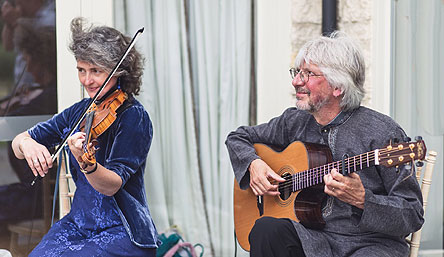 mwe3:
What was it like studying guitar with world-renowned guitarist John
Williams at the Royal College of Music? John Williams is/was a major
influence on so many guitarists so I would think the same would be
true in your case too! I remember the famous Williams'’ Sor Studies
album and his albums with Julian Bream and his rock albums with Sky.
Do you have a favorite Williams album or two or period and do you
keep in contact with him?
mwe3:
What was it like studying guitar with world-renowned guitarist John
Williams at the Royal College of Music? John Williams is/was a major
influence on so many guitarists so I would think the same would be
true in your case too! I remember the famous Williams'’ Sor Studies
album and his albums with Julian Bream and his rock albums with Sky.
Do you have a favorite Williams album or two or period and do you
keep in contact with him?
Nick Hooper: John was very busy touring back in the early 70s
when I studied with him at the Royal College of Music, so I didn’t
see him regularly. He gave group lessons, more like a seminar, and
his main aim was to teach us how to transcribe and interpret music
from the baroque period such as Scarlatti and Bach. I learnt more
about his actual technique by watching him; it was a unique privilege
to be so close. I noticed that John did not want to be adulated; his
main interest was in the music, not in himself. He was a great example
to us all. Many years later, when I met him after a concert, I discovered
that he had taken an interest in my film music career, and had enjoyed
listening to my music on some of the BBC nature films such as the
series Land of the Tiger.
When I was young, my favorite album of his was CBS Records Presents
John Williams. It had such a warm sound, and was so incredibly musical.
Looking back now, I can see that he had a huge influence on the way
I play the guitar. Now here’s a funny thing: there are two John
Williams; John Williams the world-renowned classical guitarist, and
John Williams the world-renowned film composer. People often get confused…
if you put ‘John Williams guitar’ into Google, you will
probably get a photo of John Williams the film composer with John
Williams guitarist printed underneath. No wonder people are confused.
I am proud to have been associated with both John Williams: as a student
with one, and following the other in writing music for Harry Potter!
 mwe3:
What about other plans moving forward, and getting the 6 Strings
CD heard in the UK and elsewhere and other news working on performances,
writing, videos, and other music activities in 2018 and beyond? I
hope there be a follow up to 6 Strings in the not too distant
future…
mwe3:
What about other plans moving forward, and getting the 6 Strings
CD heard in the UK and elsewhere and other news working on performances,
writing, videos, and other music activities in 2018 and beyond? I
hope there be a follow up to 6 Strings in the not too distant
future…
Nick Hooper: There’s plenty going on: Judith and I have
made a fiddle and guitar album called Pete’s Trees. Gordon
Giltrap and I hope to make an album sometime. Also we have a group
with talented singer/bassist Susanna Starling. We’re all performing
in various venues near where we live, having a wonderful musical time.



